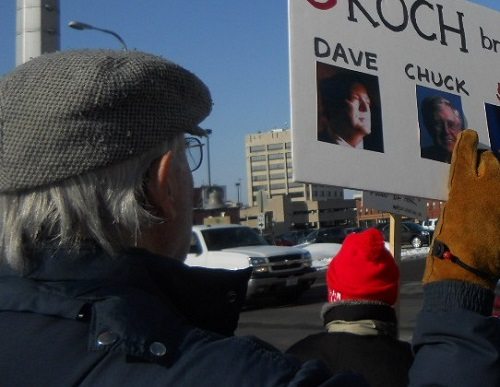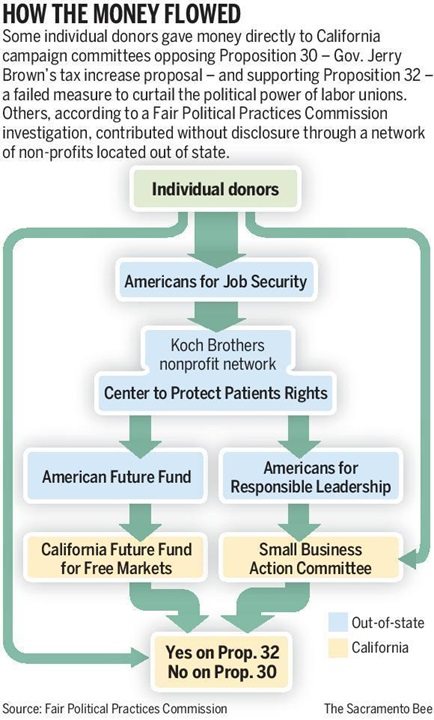
October 24, 2013; Sacramento Bee
Given that the Federal Elections Commission ranks as the most dysfunctional agency in the federal government and the Internal Revenue Service has been hobbled by the dual blows of a scandal in the Exempt Organizations division compounded by a backlog due to the partial government shutdown, it appears that the regulation of campaign contributions in American elections flowing to and through dark money is going to be done by the states or not at all—at least for a while.
In California, the Fair Political Practices Commission got two organizations with ties to the politically conservative Koch brothers to pay a $1 million fine due to campaign violations incurred in their spending of $15 million to defeat ballot initiatives concerning a tax increase and union influence in the state last year. The two Arizona-based groups had failed to properly report the sources of their funding. In other words, donors, many of them from California, donated to these Arizona dark money groups to circumvent disclosure requirements that California placed on groups funding (or opposing) ballot initiatives.
Sign up for our free newsletters
Subscribe to NPQ's newsletters to have our top stories delivered directly to your inbox.
By signing up, you agree to our privacy policy and terms of use, and to receive messages from NPQ and our partners.
Rob Tappan, a representative of the Koch brothers, including their philanthropic and business interests, said that the brothers “had no involvement whatsoever, financial or otherwise” in the two ballot initiatives, and “did not give directly or indirectly to any nonprofit group in support or defeat of these ballot initiatives.” That statement would suggest that the groups were hermetically sealed off from Koch money, but the Bee article implies otherwise, describing the Center to Protect Patient Rights, as “widely associated with the Kochs.”
This isn’t to say that had these groups accurately reported the names of their donors to the FPPC that the public would have been informed, but in an apparently unintentional step toward transparency and disclosure, the FPPC released a “sloppily redacted” filing of the donors to these groups, with enormously intriguing results:
- $9 million came from people with an address where the Fisher family, owners of the Gap, has their offices. The Fishers have long opposed the influence of the teachers’ unions.
- $500,000 came from someone named “Eli” with an address on the 12th floor of an office building on Wilshire Boulevard. Well-known Democratic donor (and school privatizer) Eli Broad’s foundation is on the 12th floor at 10090 Wilshire. Like the Fisher family, Broad, too, has been a consistent opponent of the teachers’ unions.
- $2 million came from a fellow named Charles with a post office box address that is the same as the address of Charles Schwab, the owner of the huge financial investment firm. The FPPC also released an email to Charles Koch from someone whose name was redacted, but whose message read, “I have committed an additional $2 million today, making my total commitment of $7 million…It would be great if you could support the final effort with several million.”
So where is the Koch connection? The Sacramento Bee describes what is essentially an infrastructure of Koch brothers’ nonprofits through which individual donors run their money to influence elections and referenda without having their identities revealed. The following infographic produced by the Bee shows how the money flowed from donors through Koch nonprofits to California campaign committees:

The outgoing chair of the FPPC, Ann Ravel, is in the process of becoming a member of the Federal Elections Commission. Perhaps her track record of accomplishment at the FPPC will have some educational effect on her new FEC colleagues. We don’t have high hopes. What we do hope for, however, is that in state after state, from California to New York, the public gets sick and tired of the role of secret money in political campaigns. Most voters don’t have the millions available to the Fisher family, Eli Broad, or Charles Schwab to covertly influence elections. They want to know who is buying their elections. They want real-time disclosure. In fact, they probably want the money of these corporate moguls out of the political picture. It’s time.—Rick Cohen













